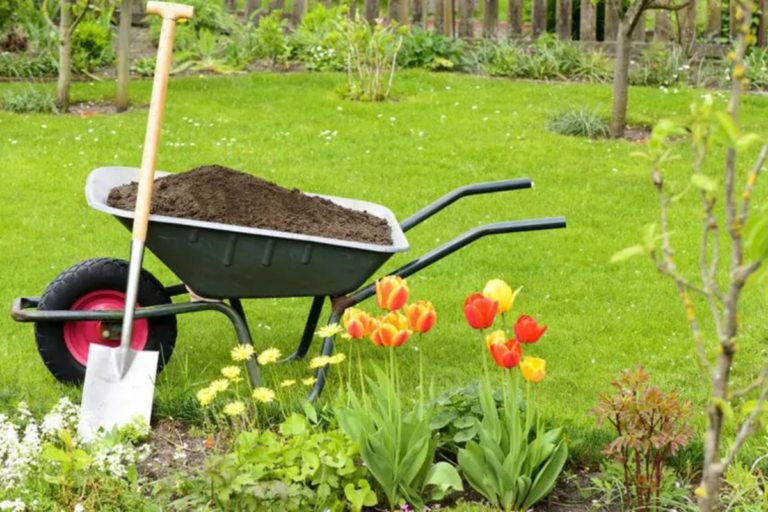Tips on Natural Lawn Care for a Green Lawn
Organic lawn care practices can help you achieve a green, healthy lawn without synthetic chemicals. Healthy soil creation, natural fertilizer usage and eco-friendly pest control are the main principles of organic lawn care. Soil testing is always the first step in organic lawn care, and it helps determine nutrient levels and pH. Amending it with organic materials like compost could improve soil structure and fertility.
Soil Testing and Amendments
Soil tests assist in knowing the condition of your soil, such as its nutrient levels and pH balance. This information helps make required amendments to form ideal grass growth conditions.
Example: You can obtain soil testing kits from garden centres or cooperative extension services near you, after which you may use this information provided to add compost, organic fertilizers or lime if necessary to adjust pH levels and enhance soil fertility.
Mowing Practices
Maintaining a healthy lawn requires proper mowing practices. Raising your mower blades encourages more profound root growth, which provides shade, reduces water evaporation, and lessens weed invasion.
Example: Aim for 3-4 inch grass height to help prevent weeds from taking over while encouraging deeper roots that withstand dry conditions better. Leave clippings of grass on the ground so that they decompose back into nutrients for the plants.
Watering Wisely
Deep watering promotes profound root growth, which makes lawns more drought-tolerant. Water deeply but infrequently allows roots to penetrate further into the ground, making grass resilient against droughts.
Example: Water early morning to reduce evaporation losses and disease risk. Use rain gauges and soil moisture sensors when rinsing to avoid overwatering.
Effective Organic Methods for Weed Control
Because weed control lawn care faces significant difficulties, several organic alternatives exist to use harmful chemicals. An abundance of healthy grass naturally suffocates weeds by out-competing them.
Example: Fill in bare spots during the fall season and create a thick lawn with less weed growth. Mulch around trees and shrubs using wood chips or straw that will prevent the germination of weed seeds and conserve moisture in the soil.
Hand-pulling and Organic Weed Killers
For small infestations, hand pulling is an easy way to control weeds. Consider applying organic herbicides made from natural substances like vinegar or corn gluten meal for larger areas.
Example: Vinegar-based solutions can manage broadleaf weeds without harming surrounding grass. Corn gluten meal acts as a pre-emergent for stopping weed seeds from sprouting.
Pest Control and Fertilization
Eco-Friendly Pest Control:
Predators, beneficial insects, and safe treatments are used in organic pest management for turf pests. BiOcontrols such as ladybugs, nematodes, and beneficial bacteria work effectively without causing any harm to the surroundings.
Example: Beneficial nematodes can help control soil-dwelling pests like grub worms when introduced into your yard. Diatomaceous earth repels ants as well as fleas.
Natural Fertilizers:
Organic fertilizers such as compost manure bones supply essential nutrients without polluting the environment with synthetic chemicals. These improve soil health, thereby enhancing strong grass growth ability.
Example: Add a thin layer of compost to enhance soil structure and provide nutrients for your lawn. Fish emulsion or seaweed extract are refined organic fertilizers that may be applied foliar or through drenching on the ground.
Conclusion
Although getting a good lawn without pesticides is impossible, going organic with your lawn care gives you a lush, green lawn and supports a healthier environment. Creating a beautiful lawn without pesticides is possible by concentrating on soil health, correct mowing, wise water use, effective weed control, earth-friendly pest management and natural fertilizers. These sustainable practices will create an environmentally friendly, well-flourishing green turf.
This adoption will make your yard even more attractive and help make you greener. Please share your know-how and experiences so that others can learn about the benefits of organic lawn care; hopefully, many others will be inspired by you to make their lawns greener.
Explore More Gardening Tips and Ideas
- Growing Bonsai: Tips for Miniature Tree Enthusiasts
- Buying Bonsai: Tips for Selecting Your Perfect Tree
- Bonsai Potting: Essential Tips for Tree Care Success
- Bonsai Maintenance: Essential Care for Tiny Trees
- Mastering the Art of Shaping Bonsai: A Beginner’s Guide


